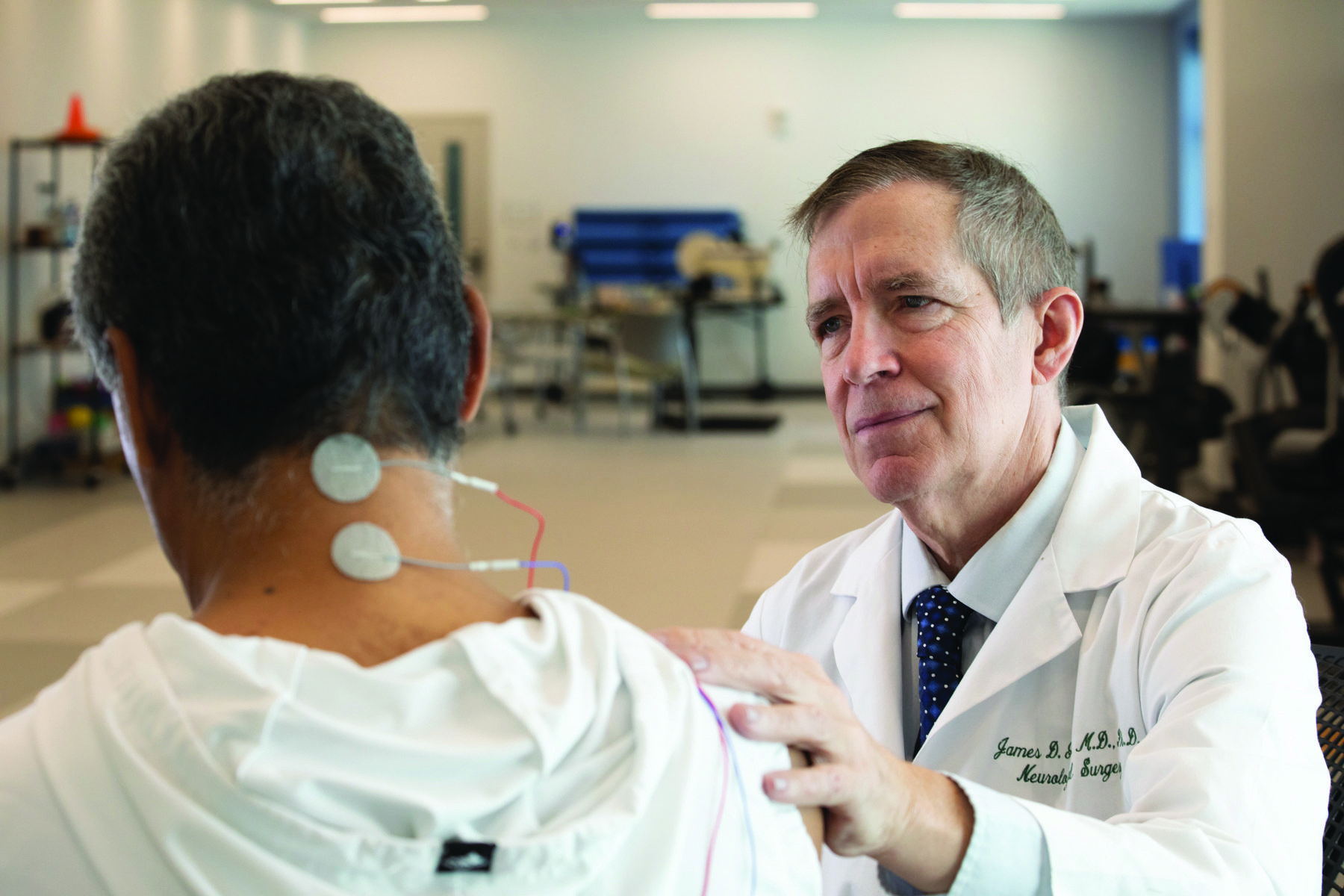(November, 2023) Neuromodulation is a rapidly growing field of research that is exploring the use of electrical stimulation to modulate the activity of the nervous system. This approach has shown promise in the treatment of a variety of conditions, including spinal cord injury (SCI) and stroke.
The Miami Project to Cure Paralysis, a designated center of excellence at the University of Miami Leonard M. Miller School of Medicine, has several faculty members conducting research on the use of neuromodulation to improve motor function in people with SCI and other neurological conditions.
James Guest, M.D., Ph.D., Professor of Neurological Surgery, recently served in the role of principal investigator for the Up-LIFT study, which evaluated the use of transcutaneous spinal cord stimulation (tSCS) to improve upper extremity motor function in people with chronic SCI. The study concluded in 2022 and found that tSCS was safe and effective in improving upper extremity function in people with chronic SCI.
Onward, the industry sponsor for the Up-LIFT study, has famously manufactured an implanted version of the device and is moving toward a trial in SCI for orthostatic hypotension. This is a condition that causes people with SCI to have low blood pressure when they stand up, which can lead to dizziness, fainting, and other problems.
Dalton Dietrich, Ph.D., Scientific Director of The Miami Project and Professor of Neurological Surgery amongst many other titles, is the principal investigator of the BrainQ study, which is evaluating the use of frequency-tuned extremely low frequency and low intensity electromagnetic fields (ELF-EMF) to improve upper extremity motor function in people with chronic SCI and acute stroke. The BrainQ technology is a non-invasive procedure that uses magnetic fields to stimulate the brain and spinal cord.
The BrainQ chronic SCI study concluded in 2022 and found that ELF-EMF was safe and effective in improving upper extremity function in people with chronic SCI. The BrainQ stroke acute study, afforded by access to the inpatient setting in the new Lynn Rehabilitation Center, is ongoing and is expected to conclude in 2024.
Matija Milosovic, Ph.D., Assistant Professor dual appointment with The Miami Project and College of Engineering, is a recently arrived faculty member excited to get started applying his expertise with time-coupled central and peripheral stimulation for motor function. Time-coupled central and peripheral stimulation is a technique that uses electrical stimulation to both the brain and the spinal cord in a coordinated manner. This approach has shown promise in animal models of SCI and stroke, and Dr. Milosovic is now working to translate this research to human trials.
Patrick Ganzer, Ph.D., another dual appointment Miami Project and College of Engineering faculty member is conducting research on the use of neuromodulation to improve motor function in people with SCI and stroke. Dr. Ganzer is particularly interested in the use of vagal nerve stimulation (VNS), which involves implanting a small electrical device near the vagus nerve in the neck. VNS has been shown to improve motor function in animal models of SCI and stroke, and Dr. Ganzer is now conducting a clinical trial to assess the safety and efficacy of VNS in people with chronic SCI.
The research being conducted by Dr. Guest, Dr. Dietrich, Dr. Milosovic, and Dr. Ganzer is just a small sample of the work being done at The Miami Project to Cure Paralysis to develop new treatments for SCI and stroke. These researchers are hopeful that neuromodulation will one day be a safe and effective way to improve motor function in people with these devastating conditions.
In addition to the research being conducted by these individual faculty members, The Miami Project is also home to the Neuromodulation Center, which is a multidisciplinary team of experts who are dedicated to advancing the field of neuromodulation. The Neuromodulation Center provides clinical care, conducts research, and offers educational programs to help patients, families, and healthcare providers learn more about this promising approach to treating neurological disorders.
The work being done at The Miami Project to Cure Paralysis and the Neuromodulation Center is helping to pave the way for a future where neuromodulation can be used to improve the lives of people with SCI, stroke, and other neurological disorders.

